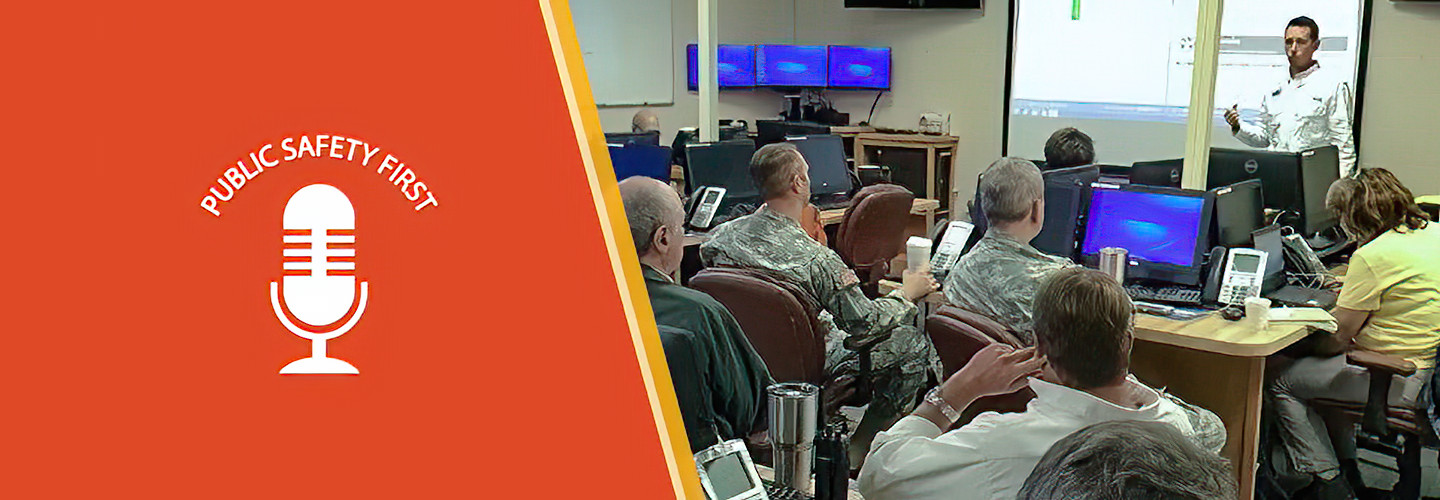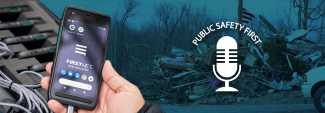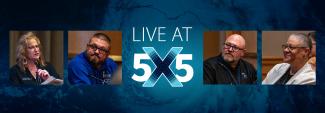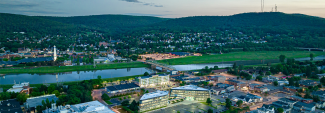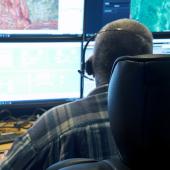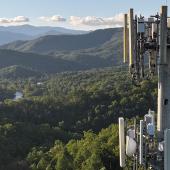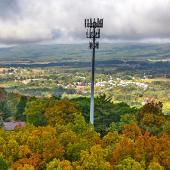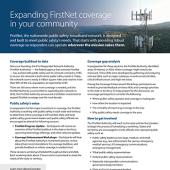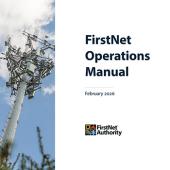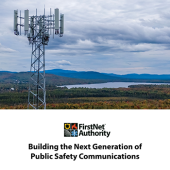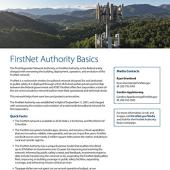Summary
Guest
Gerald Risner, FirstNet Authority Senior Public Advisor
Spencer Hawkins, Macon-Bibb County Emergency Management Director
Transcript
Preview
Episode 71| Emergency Planning for Natural Disaster: Redefining Readiness in Macon-Bibb, Georgia
GERALD RISNER: Hi, I am Gerald Risner, a senior public safety advisor to the FirstNet Authority and I am here with Spencer Hawkins, the Emergency Manager for Macon-Bibb County, Georgia. I’m going to ask you, if you would Spencer, to just introduce yourself. Kind of give us an idea of who you are and what your role is there in Macon-Bibb. And kind of just describe a little bit about your organization and what you guys do.
Episode 71| Emergency Planning for Natural Disaster: Redefining Readiness in Macon-Bibb, Georgia
GERALD RISNER: Hi, I am Gerald Risner, a senior public safety advisor to the FirstNet Authority and I am here with Spencer Hawkins, the Emergency Manager for Macon-Bibb County, Georgia. I’m going to ask you, if you would Spencer, to just introduce yourself. Kind of give us an idea of who you are and what your role is there in Macon-Bibb. And kind of just describe a little bit about your organization and what you guys do.
SPENCER HAWKINS: My name is Spencer Hawkins. I am the Emergency Management Director for Macon-Bibb County government. I started here in 2015 as the Deputy Director and then, a few months after I joined the agency, I was then appointed as the director. And I've been the director since December of 2015 and I'm absolutely enjoying myself.
GERALD RISNER: That's awesome. Tell us a little bit about what are some of the unique challenges for your area or your region that you that you face in, in Emergency Management there in Macon-Bibb.
SPENCER HAWKINS: One of the big things was kind of a funny story. I started my career in Florida. I spent about a decade working in Central Florida. I was with Orlando Emergency Management during 2004, when got hit with three back-to-back major hurricanes, Hurricane Charlie Francis, and Jean went right over the top of Orlando and I lived in South Florida for a long time, and I was there for Hurricane Andrew. And, when I came to Macon, and was asking them and you know, just getting a feel for the for the, for the community, for the area I asked them about the hurricane preparedness and they kind of looked at me and said, well, we're in the center of Georgia, we have tornadoes, we have floods. We don't have hurricanes. That's not something we deal with. That's a Savannah problem. That's a Key West problem. That's not a Macon, Georgia problem, I said, okay. They said, have you heard of the flood of 94? That was our big flood. And I said, okay, well, you do realize that the flood of 94 that severely impacted Macon was caused by a tropical event. Tropical Storm Alberto was what caused the major flood of 94 here in Macon, and they just kind of laughed, oh, okay, well, maybe we do have to think about, you know, hurricanes. So, we started preparing. We started talking about it and then we had Hurricane Matthew and in 2016 that impacted Savannah. We got a ton of evacuees, and then we had Hurricane Irma in 2017 that gave us a direct hit. Dropped 100,000 cubic yards of debris on Macon and we also had sheltering at the same time. I think one of the biggest challenges that we have is making sure that our community understands that their risk is not necessarily what they think. That we have a much greater risk than previously anticipated, and we need to be ready for that. And it's not something crazy, the steps that you're going [to] take to prepare for [a] tornado are virtually the same that you're going to be preparing for a hurricane, and that's great. That makes my job a lot easier because I can message the same information to my community, but it’s just, getting my community to understand that when June 1st comes around and we start talking about hurricane preparedness and we start tracking the tropics and all of that, that it's something that we need to take seriously. And so, I would say over the last eight years, we have been able to make that shift so that when we do talk about hurricane preparedness, it's taken seriously.
GERALD RISNER: Yeah. That's something when you get into the interior of the United States a little bit, you know, I know Georgia is a coastal state but Macon-Bibb, being the center more so, you know, it's not top of mind for the average folk. But in the Emergency Management industry, right, you, those contingencies a have a domino effect from storms that happen hundreds of miles away. To have a mindset to think about that and to make that preparedness, I think is one of the one of the big challenges, I'm sure you would agree with that. Being the Emergency Management Agency there in Macon-Bibb, I would imagine have to work with all agencies of public safety all the way down to what we consider secondary agencies. What are the communication challenges that you have?
SPENCER HAWKINS: You know, one of our big communication hurdles is the ability to get everybody on the same system. I'll kind of take three different these three different examples for you, or four, Sheriff's Office, fire department, EMA and public works. So, Sheriff's Office. Sheriff of Macon County is a constitutional officer elected independently. They're their own standalone agency. They get funding from Macon-Bibb County. But Sheriff Davis, runs the Sheriff's Office as he sees fit, and that's the way it works. Then you've got the fire department. Fire Chief worked directly for the County Manager, is part of Macon-Bibb County, definitely like that. The first line frontline team. And then you've got EMA. Once again, we are part of Macon-Bibb County. Sometimes looked at as a first responder, sometimes not. Kind of in that quasi gray area. Then you've got public works, once again, county department working, you know, working for the county manager but not necessarily ever looked at as a first responder. My communication issues come into the fact that I've got the Sheriff's Office and the fire department on your typical 800-megahertz big box radio with the shoulder mic and all that kind of good stuff. And they've got the relay towers and all of that. Fire Department is on the same 800-megahertz system. You know, they talk, they do all that kind of good stuff. EMA, we have radios. We are on the system, but we don't use them nearly as frequently on a day-to-day operation like the Sheriff and Fire department do. And then you have public works who does not have any of those radios, does not have any of that connection. But when the disaster happens, Sheriff, Fire, EMA and public work all need the ability to talk together and talk with each other very, very quickly, in an uninterrupted fashion. And so, whether we have LMR, the land mobile radios, cell phones, other type of radios trying to get everybody on the same communication system in a financially challenging situation. And I talked to my other partners and other local governments. That is not a new thing- trying to get everybody on the same system that we can all talk together that we can use during non-disaster situations as well as disaster situation is a big challenge.
GERALD RISNER: That kind of brings us down to the conversation that that we've been having with you about FirstNet, right, and the availability of FirstNet and kind of how it's used and being able to utilize it without having a lot of infrastructure in the background. I know you are a FirstNet customer, so tell us a little bit about how, you use FirstNet there at the EMA office to help support your mission there for Macon-Bibb.
SPENCER HAWKINS: I'm going go back in time here to 2004, when I was at City of Orlando during Hurricane Charlie, Francis, Jean. When Hurricane Charlie came through, it really devastated the city of Orlando in a way that they hadn't seen in many, many years. Along with that devastation, not only did it take down a significant portion of our tree canopy, but it also took down our cell phone communications. Either cell towers were without power, or cell towers were down, or the cell towers were so flooded and inundated with calls that you couldn't get through. And so, a lot of our communication was via the LMR radios or landline phones when they worked or, you know, kind of a hodgepodge of all of that. And since then, it's always that way. Whether you're a citizen who's trying to call and check on your elderly neighbor, or whether you're an emergency responder trying to get through, cell phone communications, which at this point are our country primary form of communication. And so, everything gets overwhelmed. Everything gets inundated I remember after 2001 was 9/11 and the 9/11 report talked about, there's always these rumors that the federal government is going to create its own cell phone company and we're like, OK, OK, we'll see that when it happens. And then, several years later, FirstNet popped up. And I was at a point here in Macon-Bibb County that I was able to be in a decision-making position to look at FirstNet, see what the availability was, see what the infrastructure was for emergency communications here in Macon-Bibb County and one of the things that really was enticing to me to, at least, start investigating and start a trial and things like that with FirstNet when we had spoken with the initial rep promised us the world. We're going to do this and this and this, and it's going to be this, and it's going to be this. And I said, yeah, that's a great sales pitch. And he says, yeah, it is a great sales pitch because it has to be true because, the things that I'm telling you, we are required to do by the federal government by oversight of the FirstNet Authority, and if we don't, we owe millions of dollars in penalties. That piqued my attention. The fact that there was a regulatory oversight for emergency first responder communications that was being provided at the user level was a gamechanger. FirstNet comes in and says, yeah, we’re going to do all of this stuff for two reasons. One, we want to and two, we have to. I’m like okay, well, let’s try this out. We did the test. And we were very, very happy with our first initial test of FirstNet. With the connection, with the speeds, with the ability, also with the ability for customer service, the fact that we could make a phone call and talk to an actual human being that would answer the phone and start troubleshooting our problem or issues if we had it. The other thing that really piqued my interest is, the fact that understanding that there is a limited amount of bandwidth on any cell phone system, even the best that are, you know, FirstNet approved and knowing that they are focused on what we'll call the primary first responders, EMA, Sherriff, Fire, EMS folks like that. But they were also inclusive of those secondary responders. Your public works, recreation, Red Cross, hospital, things like that. And that, with FirstNet, you could have the ability, and I’ll take my public works team, because when the disasters happen, my public works team is one hundred percent a first responder. Because I can’t get my Sheriff Office patrol vehicles through, I can’t get my firetrucks through those roads with a three-foot in diameter oak tree laying in the middle of it. My public works team can come in, move those trees, clear those roads, so they can affect first response. The ability that I can take my public works team on a FirstNet cellphone, and during a disaster, elevate them to the same level as EMA, Sheriff, Fire, EMS, was huge. Knowing that when they’re out in the field, and they’re trying to figure out what roads to clear, because we have responses to do from Sheriff, Fire, and EMS, they have to make that call. Every single time. And I can’t be worried about if they’re going to be bumped off the tower because they need to make a phone call. So, that was a huge benefit, and then the latest iteration. The fact that it looks like that we're going to be able to connect, have some sort of integration between the land mobile radios and a FirstNet system with the new FirstNet radios. The fact that I have the ability to buy $0.99 radio that can connect to FirstNet that is priority and preemption, that can still connect to Sheriff and Fire land mobile radios, that solves another huge problem of disparate communication systems during disasters.
GERALD RISNER: What I'm hearing is you basically came to FirstNet out of necessity, right? When we are in public safety, when you when you are a director such as you are over Emergency Management, you have to juggle a lot of things., It's not always working the imminent disaster at hand. It's how do you weigh budgetary constraints versus the tools that you need to handle said disasters, right? That's not lost on any discipline in public safety. So, would you recommend FirstNet to other Emergency Management and also all disciplines?
SPENCER HAWKINS: When I look at doing my job and I've had this conversation with the Sheriff, with the Fire Chief, the most important thing to me is ensuring that the people that we serve, the citizens of Macon-Bibb County are safe and that we can do our job as first responders, as public safety to ensure their safety and protection. What I always look for is what tool will give me the best opportunity to serve my community. And I am looking for the best system for the best tool that will allow me to do my job in best fashion and the best way moving forward. FirstNet, for communication, is that tool for me to use that, and if I'm talking to other members of public safety, I would say you absolutely need to look at FirstNet and see what are their offerings and can FirstNet either support and or enhance what you are doing to serve your community. with the ability that you can get from FirstNet with the fact that it is supported and there's oversight from the FirstNet Authority. I think a lot of public safety agencies would be very hard pressed to turn away from that, and not give it a serious serious look. Maybe if there's a melding of what your current technology is like a land mobile radio or something like that and having it FirstNet as an enhancement to that. You know, you always need to make sure that you're looking at the landscape. What's out there and what will help you do your job. The most effective way. And for us here, making them county. We've done that search, we've reviewed that, and FirstNet is where we are right now.
GERALD RISNER: Spencer, thank you again for your time today. Thank you for the discussion. Thank you for your service to public safety, especially, I'm sure the folks in Macon-Bibb are glad to have you. And with that, we'll wrap up our meeting here today.


